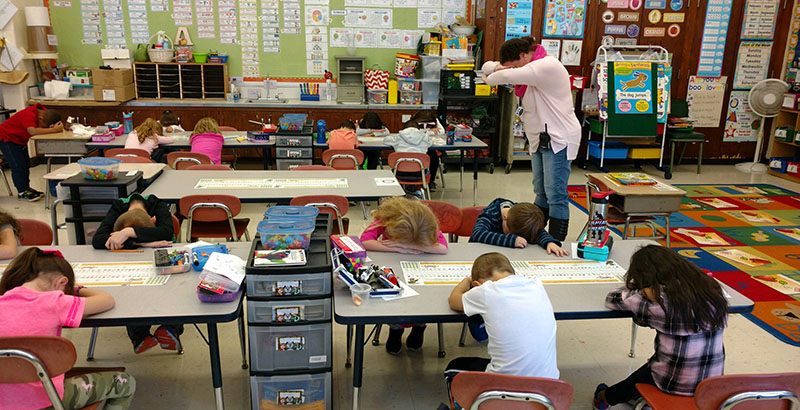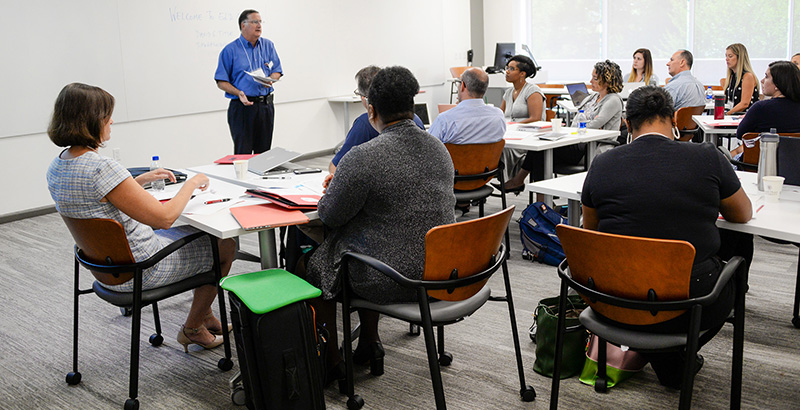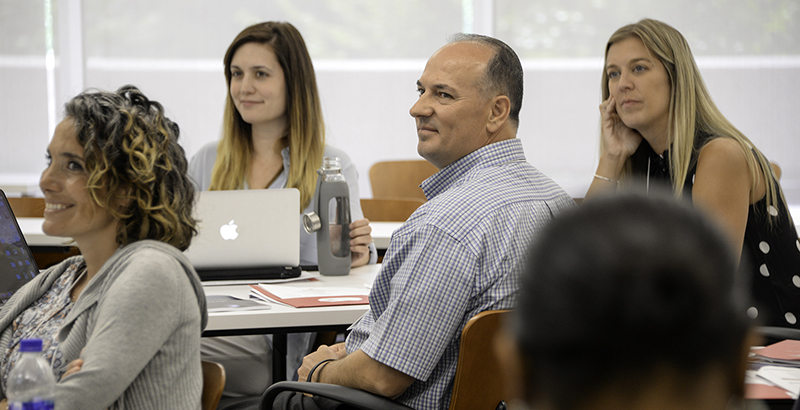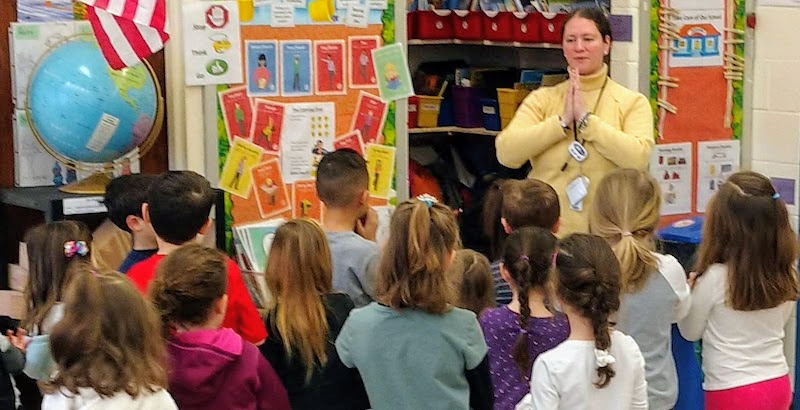New Education Doctorate Focused on Social-Emotional Learning Is One of the First of Its Kind as Experts Call for Better Teacher Training on the Whole Child

Seven years ago, Michael P. Alfano was sitting in his office at Southern Connecticut State University when a faculty member ran into the room in tears. That was how he first learned about the deadly school shooting 20 miles away at Sandy Hook Elementary School, where 26 people — including a student in his graduate education program, first-grade teacher Victoria Soto — were killed.
The tragedy sparked a reckoning in Alfano — and educators across the country — who questioned whether school systems had failed to support individuals who acted out so violently. For Alfano, part of preventing a shooting, bullying, or any other form of violence in schools meant addressing childhood trauma, helping students understand and manage emotions, and training educators in this work.
This year, Alfano launched a new education doctorate at Sacred Heart University to do just that. One of the first of its kind in the country, the doctorate focuses on social, emotional and academic leadership. Alfano, who is now the dean of the Fairfield, Connecticut, university’s school of education, hopes the program can prepare principals, superintendents and other school leaders in supporting teachers and students as well as becoming experts in the fast-growing field of social-emotional learning.
“What do you do with children who are coming to your classroom from poverty and haven’t had breakfast or dinner the night before or any other myriad sets of challenges that teachers live in, day in and day out?” Alfano said. “[Teachers] need the leadership and management of their principals and their superintendents and their directors and coaches to have the skill set and expertise to manage in those spaces.”
The program also fills a need in the social-emotional learning space: teacher training. A recent Aspen Institute report from researchers, educators, parents and students called for redesigned teacher preparation programs that focus on understanding trauma and teaching social, emotional and cognitive development skills. A 2017 study of teacher colleges found that few programs are instructing educators in how to support students’ social-emotional learning.
“We felt like this would be an opportunity to fill a need in a market because this is an area that is not going away — in Connecticut or anywhere else,” said David Title, program director for the EdD at Sacred Heart University.

This is the first doctorate focused on this topic in the state, college leaders said, and it may be one of the first in the country. However, other universities also offer education programs that target social-emotional preparation. In New Jersey, the College of St. Elizabeth and Rutgers University offers a certificate in social-emotional learning and character development. The University of British Columbia has a Master of Arts program with a concentration in social-emotional learning. The Center for Reaching and Teaching the Whole Child in Sunnyvale, California, has received attention for integrating social, emotional and cultural competencies into teacher training programs like those at San Jose State University.
Title, who used to work as a superintendent in Fairfield and Bloomfield, Connecticut, had noticed increasing student mental health needs, the spread of bullying onto social media platforms, and economic stressors on families that were impacting students. Research from the Centers for Disease Control and Prevention has found that diagnoses for anxiety and depression in children have increased by three percentage points over eight years.
Eighteen students make up the first cohort of graduate students at Sacred Heart University, who began their studies this fall. The course is online, so while students can come to campus a few days per year for meetups, the majority of their work will be virtual, through video lessons, discussion boards and social media. This will allow them to continue their jobs as educators while completing the course at their own pace.
The education doctorate, or EdD, will take three years to complete. The first year is focused on academic research and writing skills, though the research these students will be studying is often related to social-emotional learning. The second year is a deep dive into social-emotional learning and childhood trauma. The third year will be focused on the students’ dissertations, in which they will research a problem of practice in their schools connected to social-emotional learning, such as assessing how well students are acquiring skills.

The framework for the doctorate is based on the Carnegie Project on the Education Doctorate, which distinguishes an education doctorate (EdD) as a degree meant for school leaders to apply research to real-world education issues. This is different from a PhD in education, which prepares candidates to become professors and conduct research.
“I cannot change society. I can’t change that it’s more rigorous and demanding of children and adults. However, I can give them tools.”
—Kimberly Atkinson, SEL doctoral student
One student, Kimberly Atkinson, says she and her fellow classmates put in 15 to 20 hours of studying a week on top of their busy lives as educators. The doctorate is a financial lift as well for students at $900 a credit for a 60-credit course load. But Atkinson, who is a kindergarten teacher at Booth Hill Elementary School in Shelton, Connecticut, sees this program as an investment in something she’s passionate about: helping students and adults express their emotions in productive ways.
An educator of 17 years, Atkinson had started to notice that her kindergartners were coming to school stressed, angry and high-strung. At the same time, she observed that adults were also having similar problems of being unable to express or regulate their emotions. Atkinson started researching solutions and came across a yoga program for her students, which helped them calm down and control their emotions. She started to embed this work into her daily lessons in the classroom, and she shared what she learned with other teachers in the district.

“I cannot change society. I can’t change that it’s more rigorous and demanding of children and adults,” Atkinson said. “However, I can give them tools.”
The graduate students don’t need to have their specific research projects decided on yet, but right now, Atkinson said she’s interested in how social-emotional learning can be better infused into curriculum. This kind of work could spur her onto a path like district curriculum writing, though she said she’s keeping her options open.
While some schools have turned to social-emotional learning as a response to violence or aggression, others have opted for “hardening” practices, from metal detectors to armed security guards patrolling campuses. Amanda Nickerson, who studies school violence as a professor of school psychology and director of the Alberti Center for Bullying Abuse Prevention at the University of Buffalo, said there is some danger in focusing too much on school security measures, as it can make students fearful.
“There is pretty good evidence that social-emotional learning programs do both increase those social-emotional competencies, but also reduce aggression, including bullying, peer delinquency, delinquent behavior,” Nickerson said. “Obviously, it’s harder with a very rare event like a school shooting to say whether or not social-emotional learning can reduce that, but when we look over hundreds of studies on social-emotional learning, they have pretty consistent outcomes showing that they do reduce aggressive behavior and they also increase academic achievement.”
It’s important for school leaders to have training in social-emotional learning because they are the ones making decisions about programs being used and how it is infused throughout the school, Nickerson said. She expects that social-emotional learning positions might become more common at schools or districts.
Some worry that as interest in social-emotional learning grows, there will be an expanded market for products being sold to schools that may not be evidence-based. Part of the appeal of this education doctorate program, Title said, is that it can help school leaders become aware of how to tell what sorts of tools are valid.
“There’s no shortage of people trying to sell you something on this,” Title said. “Somebody has to be a wise consumer. That’s going to be part of what this is: How do we evaluate these [programs]? How do we measure this? Are we making any progress?”
Get stories like these delivered straight to your inbox. Sign up for The 74 Newsletter

;)
